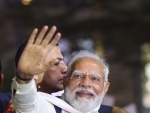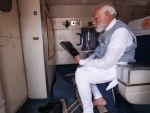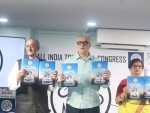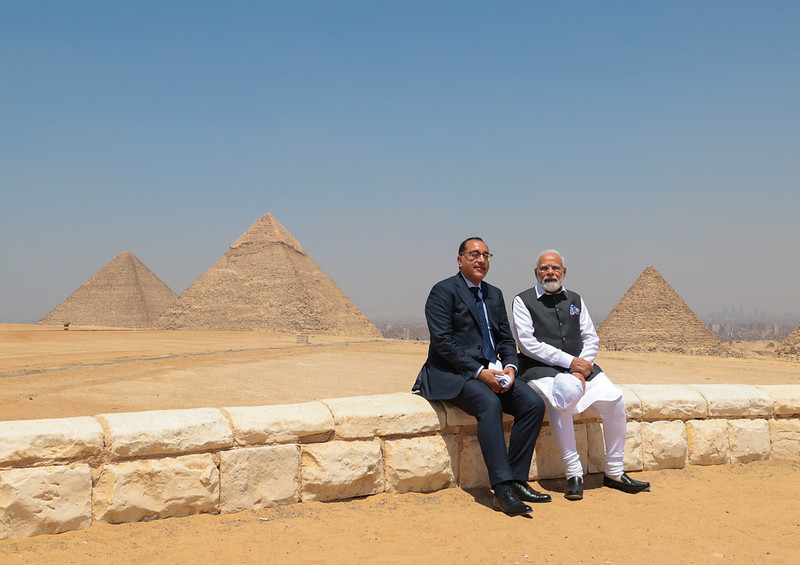 Checkmating China
Checkmating China Joint Indo-US initiatives and Modi's Egypt visit checkmate China in the Middle East
The two-day visit of Indian Prime Minister Narendra Modi to Egypt on June 24 and 25, 2023, is a potential game changer in bilateral relations. With increased Indian presence in Egypt, the efforts of China to build its presence in the Middle East is under stiff challenge.
“The U.S. may no longer be the undisputed big dog in the region, but as long as India expands its presence in the Middle East neither Russia nor China can assume that role,” Steven A Cook has observed in an article in the American magazine ‘Foreign Policy.’
The Indian initiatives in Egypt are an extension of the collaboration between India and the United State to counter China beyond the Indo-Pacific region and into the Middle East. The Indian capabilities at infrastructure building will counter the Belt and Road Initiative of China in the Gulf countries.
Egypt can also serve as a gateway through which India can send its goods to Africa and Europe and meet the Chinese challenge in these areas, particularly in Africa. The Middle East is becoming increasingly important for India due to its trade interests and also for the millions of Indians who work in the region and send remittances back home.
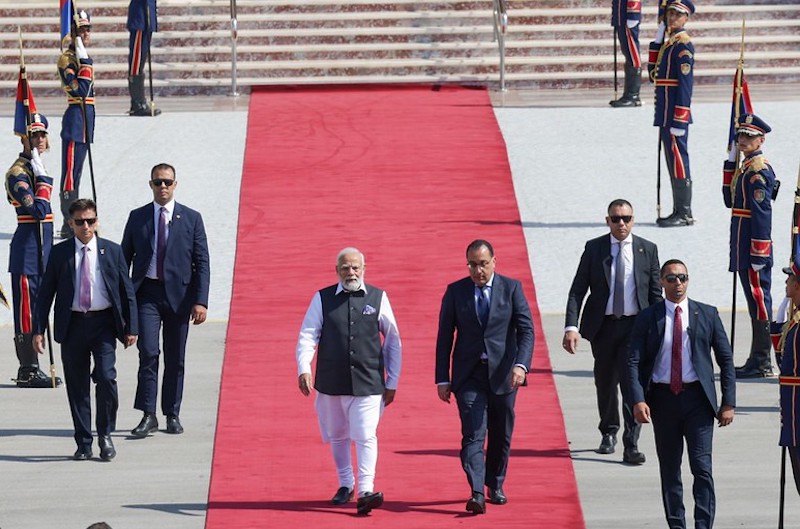 Narendra Modi arrived in Cairo on his first State visit to Egypt received by Mostafa Madbouly, Prime Minister of Egypt at the airport
Narendra Modi arrived in Cairo on his first State visit to Egypt received by Mostafa Madbouly, Prime Minister of Egypt at the airport
With all the expansion of India’s economic and security ties with the Middle East, however, the Indian position on Iran may differ sharply with those of the United States and Israel, Stephen Cook has pointed out. “It is unlikely that India will line up with the United States, but it is also unlikely that New Delhi will undercut Washington the way both Beijing and Moscow have done.”
Prime Minister Narendra Modi was received by President of the Arab Republic of Egypt Abdel Fattah Al-Sisi at Al-Ittihadiya Palace on June 25. An agreement to elevate the bilateral relationship between India and Egypt to a “Strategic Partnership” was signed by the two leaders. Prime Minister Modi and President Sisi also discussed more cooperation in the areas of food and energy insecurity, climate change and the need for the Global South to have a concerted voice. The President of Egypt also conferred on the Indian Prime Minister the ‘Order of the Nile,’ the highest civilian award of Egypt.
Prime Minister Narendra Modi had a meeting with the ‘India Unit’ in the Egyptian Cabinet, headed by Prime Minister of Egypt Musfafa Madbouly. There were discussions on ways to strengthen cooperation in the areas of trade and investment, renewable energy, green hydrogen, information technology, digital payment platforms, pharma and people-to-people ties.
Besides business talks, the Indian Prime Minister also met the Grand Mufti of Egypt His Eminence Shawky Ibrahim Allam who emphasized on the strong cultural and people-to-people relations between India and Egypt and appreciated the leadership of Prime Minister Modi in fostering inclusivity and pluralism. Discussions focused on issues related t*o social and religious harmony in society. Prime Minister Modi conveyed that India would set up a Centre of Excellence in IT at Dar-al-Ifta, a centre of Islam and Islamic legal research in Egypt.
According to a Foreign Policy report, India is planning a significant connectivity project to counter the growing influence of China in the Gulf. The project aims to link New Delhi to the Middle East through a series of roads, railways and seaports. The idea for the project was formed under the I2U2 forum for economic cooperation, which includes India, Israel, the United Arab Emirates and the USA.
The project has been discussed in a meeting between the National Security Advisor of India Ajit Doval and his counterparts from the USA and the UAE, as well as Saudi Crown Prince Mohammed bin Salman.
According to reports, the connectivity project aims to leverage the capacity of India as a provider of infrastructure, the Indian track record including the construction of the largest railway system in the world and cross-border electricity sharing arrangements. I2U2 is not formally an entity focused on China because of the close commercial cooperation of both the UAE and Israel with China. It is an open secret, however, that the I2U2 group is a vehicle for Indo-U.S. cooperation to counter China beyond the Indo-Pacific and in the Middle East.
“Nobody said it out loud, but it was about China from day one,” an Israeli official has been quoted to have said. The formation of I2U2 “is a clear recognition that the Biden administration is now actively involved in responding to China in multiple regions,” the Observer Research Foundation has noted. “New Delhi also understands that the China challenge has to be met not only to India’s north and east but also towards India’s west.” Both India and the U.S. now recognize that they need each other to meet the challenges from China which are not only military but also economic.

The assertion of Beijing that it wants to help low income countries develop with BRI assistance is a mask. According to analysts, the BRI is a Chinese investment platform that employs Chinese capital across infrastructure projects in emerging markets for geopolitical gains.
The focus of this investment strategy is now shifting to Saudi Arabia and the Middle East. China has signed comprehensive strategic partnerships with Algeria, Egypt, Iran, Saudi Arabia and the UAE and strategic partnerships with another eight states in the region.
Egypt is not fully trusting China, however. Cairo now wants investment from India to meet its foreign debt obligations and maintain food security.
The war in Ukraine has affected the food supply of Egypt. Almost 80 percent of the grains of Egypt are imported from Ukraine and Russia. The war has also impacted the foreign exchange reserves of Egypt. In 2022, India assisted crisis-ridden Egypt and allowed the shipment of 61,500 tonnes of wheat to Egypt despite New Delhi having put restrictions on wheat exports.. Cairo needs New Delhi.
It thinks India can help it deal with its economic crisis by expanding trade and investment in Egypt. More than 50 Indian companies have already invested in the infrastructure sector in Egypt.
With 12 percent of the global trade passing through the Suez Canal, India has kept in mind the crucial geostrategic significance of Egypt.
The expectations are also high in Egypt that the Narendra Modi government in India will announce India’s support for the desire of Egypt to join the BRICS, a grouping that includes Brazil, Russia, India, China and South Africa. By inducting Egypt in the grouping, India wants to balance China’s influence; and also prevent Pakistan, which Beijing is backing, from joining the BRICS.
With the recent improvements in the relationship between Cairo and Tel Aviv, New Delhi hopes with the help of Egypt India can also get much deeper access in Israel. According to a RAND Corporation report, Chinese investments in Israel have grown substantially in hi-tech companies that produce sensitive technologies; as well as in the construction and operation of key infrastructure projects. This presents distinct concerns to the United States, as well as to Israel itself.
The acquisition of the Haifa port in Israel by the Gautam Adani group has come, however, as a fitting reply to Beijing from New Delhi.
The Adani group of India in January 2023 acquired the strategic Israeli port of Haifa for $1.2 billion and promised to transform the skyline of the Mediterranean city of Haifa as a part of the decision of the group to invest more in Israel. These investment decisions include the opening of an artificial intelligence lab in Tel Aviv. Prime Minister of Israel Benjamin Netanyahu has described the Haifa port deal with the Adani group as an “enormous milestone” that would significantly improve connectivity between Israel and India in many ways.
Among other major Indian groups that have investments in Israel are TCS, Infosys, Mahindra and Wipro. In a visit to India in 2023, Foreign Minister of Israel Eli Cohen said India could significantly enhance regional stability in the Middle East by extending its influence, trade and diplomacy beyond the Indo-Pacific region.
The Indian efforts to checkmate Chinese attempts to use its Belt and Road Initiative to gain geopolitical advantage in the Middle East has been supplemented by the B3W --- Build Back Better World – initiative launched by U.S. President Joe Biden and his G7 counterparts; a values-driven, market-led high-standard and transparent infrastructure partnership to help narrow the infrastructure gap in the developing world by 2035.
The B3W initiative aims to mobilize bilateral and multilateral, as well as private-sector capital for investment in climate, health and health security, modernized digital technology, gender equity and equality. The B3W is planned to be global in scope and cover low and middle income countries.
Support Our Journalism
We cannot do without you.. your contribution supports unbiased journalism
IBNS is not driven by any ism- not wokeism, not racism, not skewed secularism, not hyper right-wing or left liberal ideals, nor by any hardline religious beliefs or hyper nationalism. We want to serve you good old objective news, as they are. We do not judge or preach. We let people decide for themselves. We only try to present factual and well-sourced news.





